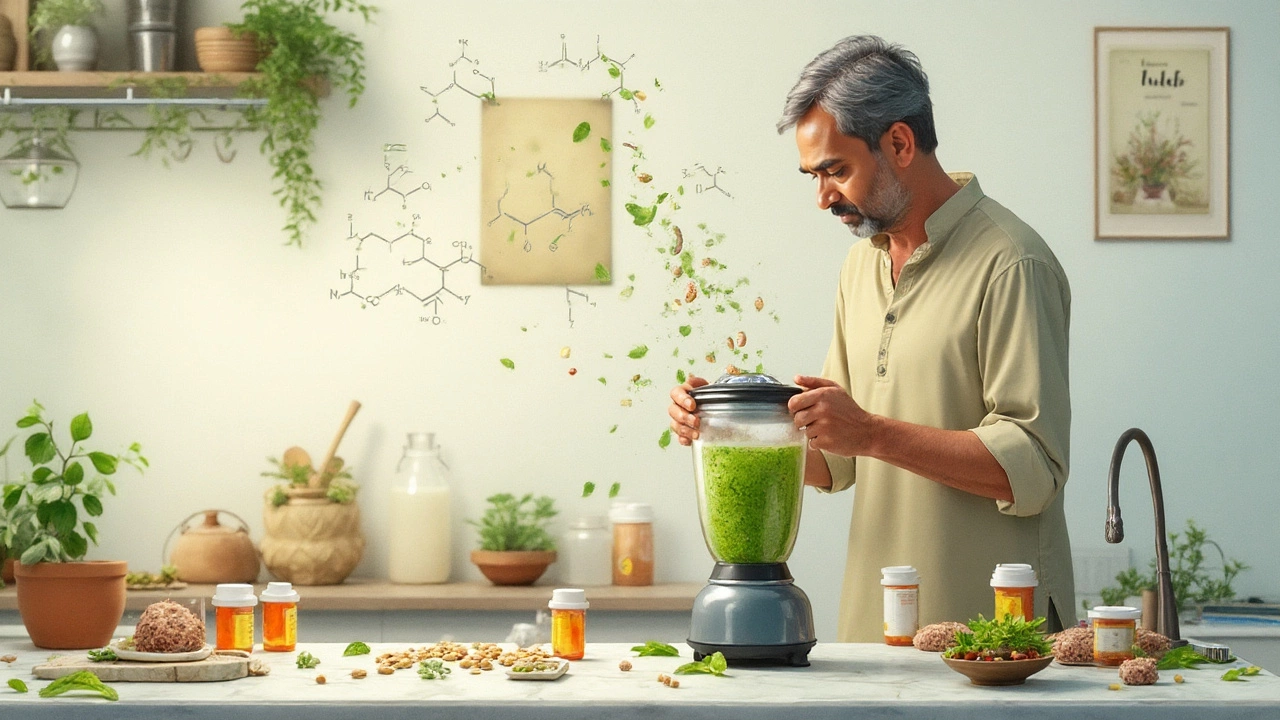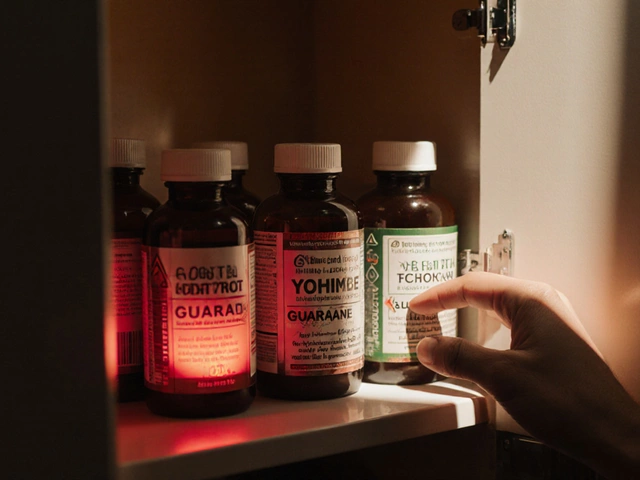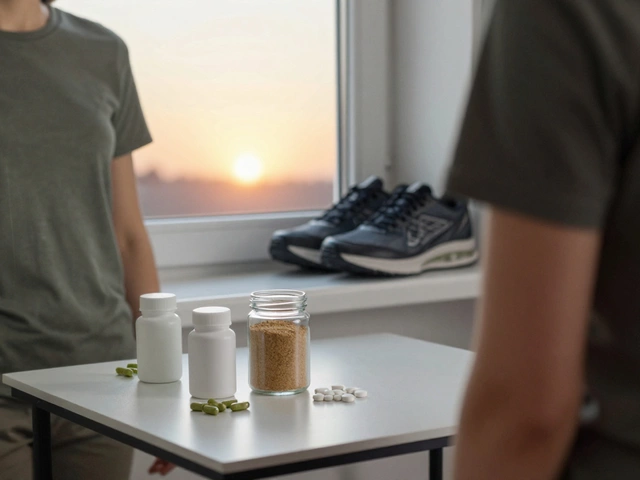Herbal Supplement Safety Checker
Herbal supplement is a dietary product that contains plant‑derived compounds intended to support health. While many people turn to herbs for a natural boost, taking too many at once can trigger unwanted side effects, drug interactions, and organ stress.
Why People Stack Herbal Supplements
Fitness blogs, wellness podcasts, and social media influencers often promote "stacking"-combining several herbs to chase a broader benefit. The idea sounds logical: if turmeric helps inflammation and ashwagandha calms stress, why not take both? Yet each product brings its own active ingredient the specific phytochemical that drives the herb’s effect, and the total load can quickly exceed what the body can process.
When "More Is Less" Becomes Real
Three main triggers turn a benign supplement into a risk:
- Excessive dosage the amount of herb taken per day - even a well‑studied herb can become toxic at high concentrations.
- Unplanned drug interaction when a herb interferes with prescription medication - many herbs affect liver enzymes that metabolize drugs.
- Organ‑specific toxicity - especially liver toxicity damage to liver cells caused by metabolites or renal clearance how kidneys eliminate waste overload.
Key Risk Factors to Watch
Understanding the anatomy of risk helps you stay ahead.
- Quality and purity - FDA regulation the U.S. Food and Drug Administration’s oversight of dietary supplements is limited to post‑market safety. Many products aren’t tested for contaminants like heavy metals, pesticides, or adulterants.
- Traditional vs. modern evidence - Traditional medicine systems such as Ayurveda, Traditional Chinese Medicine, and Indigenous healing practices have used herbs for centuries, but dosage units differ from modern supplement labels.
- Individual health status - pre‑existing liver disease, kidney insufficiency, or nutrient deficiencies can magnify toxicity.
- Concurrent supplements - mixing nutritional supplement vitamins, minerals, or protein powders with herbs may double‑dose the same active ingredient.
Common Herbs That Can Turn Toxic When Overused
Below are a few popular choices and the mechanisms that push them over the safety line.
- St.John’s Wort - induces CYP3A4 enzymes, lowering blood levels of antidepressants, birth‑control pills, and immunosuppressants.
- Kava - high doses can cause severe liver toxicity, especially when combined with alcohol.
- Green tea extract - concentrated EGCG can trigger hepatic injury at doses > 800mg/day.
- Licorice root - excess glycyrrhizin leads to potassium loss and hypertension, stressing both heart and kidneys.
Spotting the Signs of Over‑Supplementation
Symptoms can be vague, but a pattern often emerges:
- Unexplained nausea, vomiting, or abdominal pain.
- Yellowing of the skin or eyes - a classic sign of liver trouble.
- Sudden changes in blood pressure or heart rhythm.
- Fatigue, brain fog, or muscle cramps indicating electrolyte imbalances.
If you notice any of these after starting a new herb stack, pause and consult a healthcare professional.

Practical Checklist for Safe Use
Use this quick reference before adding another herb to your routine.
- Write down every supplement, dose, and timing.
- Check for drug interaction warnings with any prescription you take.
- Verify the manufacturer’s FDA regulation status - look for third‑party testing seals (USP, NSF).
- Start with the lowest effective dose and increase only under supervision.
- Monitor liver and kidney function labs every 3-6 months if you’re on a long‑term regimen.
Comparison of Herbal vs. Conventional Supplements
| Attribute | Herbal Supplement | Conventional Nutritional Supplement |
|---|---|---|
| Primary Source | Plant extracts (e.g., roots, leaves) | Isolated vitamins/minerals or synthetic compounds |
| Regulatory Oversight | Limited pre‑market FDA review | Often subject to stricter Good Manufacturing Practices |
| Evidence Base | Mix of traditional use and emerging trials | Extensive clinical data for most vitamins/minerals |
| Toxicity Risk | Higher when dosage exceeds plant‑specific thresholds | Generally low, but overdose possible (e.g., vitamin A) |
| Typical Interaction Profile | Strong enzyme modulation (CYP450) in many cases | Fewer enzyme interactions, but may affect absorption |
How to Talk to Your Doctor About Herbs
Many patients skip the conversation, fearing judgement. Frame it as a safety question: "I’m taking X herb at Y dose; could it affect my blood pressure medication?" Bring the supplement bottle or a printed label so the clinician sees the exact active ingredient list and dosage.
What to Do If You Suspect Overdose
Act quickly:
- Stop all herbal products immediately.
- Call your local poison control center - they have databases on herb toxicity.
- Seek emergency care if you have severe symptoms like jaundice, chest pain, or loss of consciousness.
- Provide the medical team with the supplement names, amounts, and timing.
Future Directions: Personalized Herbal Medicine
Genetic testing is entering the supplement world. Variants in the CYP450 family of liver enzymes can predict who will metabolize certain herbs quickly versus slowly. While still pricey, this approach could soon let you customize doses that avoid toxicity.
Bottom Line
Herbal supplements can be a useful ally, but stacking them without a plan is risky. Pay attention to herbal supplements safety, verify quality, respect dosage limits, and keep an open line with your healthcare team. When used responsibly, nature’s pharmacy supports wellness without stepping on the body’s delicate balance.

Frequently Asked Questions
Can I take multiple herbal supplements together?
It depends on the herbs, their active ingredients, and your current medications. Some combinations are safe, while others can amplify enzyme activity and cause serious drug interactions. Always check each herb’s interaction profile and start with the lowest dose.
What are the most common side effects of over‑using herbal supplements?
Gastrointestinal upset, liver inflammation (jaundice, dark urine), kidney strain, unexpected changes in blood pressure, and electrolyte imbalances are among the most reported issues. Serious cases can lead to organ failure.
How can I verify the quality of a herbal supplement?
Look for third‑party certifications such as USP, NSF, or ConsumerLab. Check that the label lists the botanical name, part used, standardized extract percentage, and batch number. Avoid products with vague "proprietary blend" claims.
Is it safe to combine herbal supplements with prescription drugs?
Not always. Herbs like St.John’s Wort, garlic, and ginkgo can either increase or decrease the efficacy of many medications by affecting liver enzymes. Always discuss each supplement with your prescribing doctor.
What should I do if I suspect a herbal supplement is causing toxicity?
Stop the supplement immediately, call poison control, and seek medical attention if symptoms are severe. Bring the product label so clinicians can identify the active ingredient and dosage.
Do all herbal supplements need a prescription?
No. In most countries, herbal supplements are sold as over‑the‑counter dietary products. However, some potent extracts (e.g., high‑dose kava) may be regulated more strictly in certain regions.
Can genetics affect how I respond to herbs?
Yes. Variations in CYP450 enzymes, which metabolize many plant compounds, can make some people more prone to toxicity or reduce the herb’s effectiveness. Genetic testing is emerging as a tool for personalized dosing.






